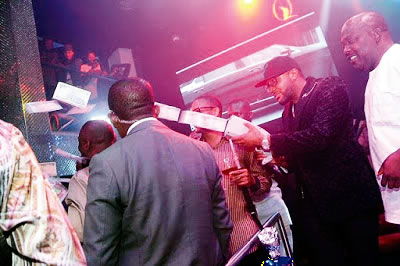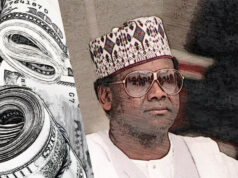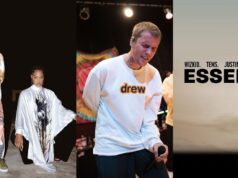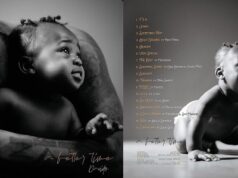
As the new couple stepped onto the dancing floor last Saturday at a Lagos events centre, soon were they swarmed with family and friends who had come to rejoice with them on their memorable day.
The live band from Ibadan played both local and exoteric lyrics, while the couple and their guests danced, and danced, until their clothes were dampened with sweat.
When the couple had danced to the delight of everyone, then came the “naira rain,” a ritual in most ceremonies in the country, with some people even going as far as competing with themselves at parties.
The guests — with piles of cash in their hands — sprayed the money on the new couple as they kept on dancing, the groom now holding the waist of his bride. It was a moment of joy for the duo.
The band weren’t also left out of the money rain show as some of the guests sprayed on them. At this juncture, their music became more exhilarating and more dance steps followed.
Then came this man decked simply in a dry lace attire. After he was sure that he had secured a vantage position, a few metres away from the dancing duo, he did not raise his hand much but then, crisp N1000 notes began to fly up above everyone on stage, then cascading and targeting the new couple. It arrested everyone’s attention.
Even the couple could not hold their shock. They nearly became onlookers at their own show. Before long, so much naira notes had littered the stage. The money man appeared to have achieved his aim, a show stopper of sort.
On a closer look, the big man was holding a gun-like machine from which naira notes were flying out to the air.
The situation whereby Nigerians hold piles of cash in their hands while spraying money may soon become a thing of the past as the gun-like device appears to have come to displace the manual ritual.
Called the money gun or money sprayer or money spraying machine, the device looks like a toy and dispenses paper items — such as cash, flyers and confetti — in a rapid but user-controlled manner.
The device works by lifting the top cover open, placing the items in the loading compartment, aiming at the direction the items are to be dispensed, and then pulling its trigger.
The money gun uses a simple motor and rubber roller assembly that causes enough friction to move cash notes and other items smoothly out of the slot, with its ergonomic handle giving the user a good control of the loading compartment and the direction the items are to be released.
The squeeze trigger allows the user to control the frequency at which the items are dispensed.
The money gun also operates using one 9-volt battery and costs between $50 (N14,000) and $300 (N84,600), depending on its loading capacity and the manufacturer.
Saturday PUNCH learned that many socialites from around the world, including from Nigeria, have been buying the product, according to information displayed on the website of one of the manufacturers, but no specific details on how many Nigerians had ordered for it.
Apart from the gun-looking money sprayer, another device, which looks like a point of sale machine, is now also being adopted by Nigerian socialites to spray money at ceremonies.
Just a few days ago, a video emerged on the social media showing the Chairman of Five Star Music and musician Kcee’s younger brother, Emeka Okonkwo — popularly known as E-Money — using the money gun to spray tons of minty notes at the wedding ceremony of Nigerian footballer Onazi Ogenyi.
The video showed him bringing out the device and raining the couple with abundant cash while they danced.
In April, he was rumoured to have sprayed over N1m at the wedding ceremony of Nollywood actor Mike Ezuronye’s sister using the same device.
E-Money’s action, however, drew a lot of criticisms from some of his fans.
Marshall Onoriode with the Twitter handle @MarshallOnos said it seemed the money spraying gun was intentionally invented for Nigerians.
“If you feel the urge to dole out cash, why don’t you just wrap it up and give to whomever you want? Why shooting it up in the air? Now I understand how deeply the money spraying culture has eaten deeply into our psyche, but this moronic culture has to stop,” an anonymous nairaland.com user commented.
But another fan with the username Alexander said he saw no wrong in what the musician did.
“It’s his money, he could spend it the way he likes. If I’m rich, I will also spray money. Why do people always condemn others for showing off their wealth?” he said.
A Lagos-based social commentator, Mr. Akeem Olatunde also said of E-Money’s action,
“This is irresponsibility of the highest order, but who can blame him since flamboyance is his way? Bill Gates, who is the world’s richest man, could afford to have a bank empty its vault in a wedding, but humility wouldn’t let him do that.
“If he were to be a Nigerian, Facebook billionaire founder Mark Zuckerberg could make the naira notes become a carpet for dancing, but no, I’m sure he wouldn’t do that. Why do we keep embarrassing ourselves here? Money should be so valued to be spent anyhow. It must be respected.
“In the advanced countries where money laundering activities are closely monitored, if you spent money like that, they would pick you up. Why do we always buy anything they bring to us? I am sure in few months ahead, this is what many Nigerians will be using at ceremonies to spray money.”
Recently also, a Nigerian, Don Skimmy Yah, popularly known as Odoligie 1 of Europe, and his wife dedicated their daughter at a church in Amsterdam, Netherlands.
At the event, whose video also went viral on the social media, family and friends were seen spraying dollar and euro notes with the money spraying machine while some people watched in utter astonishment.
“At first when I saw the video, I thought it was a pastor spraying ‘holy water’ at the couple and their baby. It was on a closer look I saw it wasn’t water they were spraying, it was money. That’s the new thing for money sprayers,” he said, adding, “I think whoever manufactured this device did so because of us. They know we spray money a lot and since none of us ever thought of making a device like that, they did it for us. How shameful!”

The inventor of the money gun
The original intention of the money gun creator was not for spraying cash notes.
According to kickstarter.com, a site which crowds funds for entrepreneurs with novelty ideas, the idea of producing a money gun came from the American entrepreneur, Michael Schexnayder, who was born and raised in Louisiana, the United States.
He started selling second-hand electronics at age of 13 and even financed his college degree by fixing iPhones, iPads and other electronics for people.
Later on, he saw a need for a new, innovative way for businesses to promote their brands through the sharing of flyers, leaflets and others effortlessly.
With the advent of 3D printing for the modern consumers, his idea was within reach.
In order to properly develop his vision, Schexnayder needed a preliminary prototype to begin. So he grabbed an old toy gun along with his handy screwdriver kit and started tinkering with the device.
After a few short months and some intuitive modifications, a simple prototype was created. He showed it to a number of friends and they instantly fell in love with it.
It was then the prototype sparked another opportunity — the money gun should not be for just businesses, but could also be used to add a wow effect at parties.
Soon, Schexnayder hired a professional product designer to turn his vision into reality. After months of going back and forth, he approved the design and sent the schematics to a 3D printing company, and the money gun was born.
Since then, several other manufacturers, including from China, have been making money guns for people to use at clubs, parties and other social events.
What about ban on money spraying?
In 2006, former President Olusegun Obasanjo sent a Central Bank of Nigeria Bill to the National Assembly which sought to curtail the abuse of the naira.
The bill wasn’t signed into law until the following year after a heated debate in both chambers of the legislature and a televised public hearing.
The main theme of the law was around amendments to the independence of the CBN, but the section that ignited debate was Section 21(3), which states, “For the avoidance of doubt, spraying of, dancing or marching on the Naira or any note issued by the Bank during social occasions or otherwise howsoever shall constitute an abuse and defacing of the Naira or such note and shall be punishable under Sub-section (1) of this section.”
The law also state it constitutes an offence to hawk, sell or otherwise trade in the naira note or any other note issued by the Bank.
Spraying under the law also include adorning, decorating anything or any person or any part of any person with naira notes or coins.
The law also includes the sprinkling or sticking of the naira notes or coins regardless of the amount, occasion or intent and further explained the “marching” to include spreading, scattering or littering of any surface with any naira notes or coins and stepping thereupon.
Violation of the above would ‘attract an imprisonment for not less than six months or N50,000 fine or both.’
However, the law drew reactions from some Nigerians at the time, with many saying nobody could ban the spraying of money as it was tantamount to taking the juice out of ceremonies.
“I believe that the Nigerian culture has a flamboyance that is unmistakable. It matters not whether the Nigerians are from the North, West, East or South. Nigerians of all walks of life tend to be extravagant, dramatic and love to have a good time. And nowhere is this reality more obvious than in a special act reserved for Nigerian ceremonies and functions,” Funmi John wrote in Honolulu Magazine.
Up till now, the law has yet to be implemented, according to findings by Saturday PUNCH.
The CBN spokesperson Mr. Isaac Okoroafor told our correspondent that the ban on the spraying of naira was still valid, saying it was a prohibited action by virtue of the CBN Act 2007.
However, Okoroafor blamed the law enforcement agencies for not doing their job as to arresting the violators of the law.
He said, “The law is still valid. It is still prohibited to spray money at parties. It has not been repealed and it is still in force.
“But you know we are just a regulator in the banking industry, we have no powers to arrest violators. We don’t have the capacity. It is the duty of the enforcement agencies to enforce the law.
“We keep reminding Nigerians that the ban is still on by the CBN Act 2007 and violating it is punishable by imprisonment and/or fine.”
Source: Punch













